人教版(2019) 选择性必修 第一册 Unit 4 Body Language Assessing Your Progress & Project 课件(23张PPT)
文档属性
| 名称 | 人教版(2019) 选择性必修 第一册 Unit 4 Body Language Assessing Your Progress & Project 课件(23张PPT) | 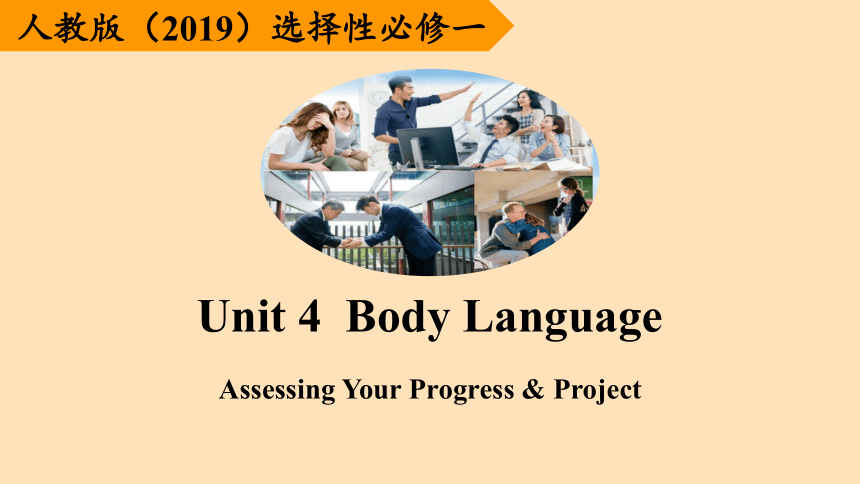 | |
| 格式 | pptx | ||
| 文件大小 | 33.2MB | ||
| 资源类型 | 教案 | ||
| 版本资源 | 人教版(2019) | ||
| 科目 | 英语 | ||
| 更新时间 | 2023-08-10 13:44:41 | ||
图片预览

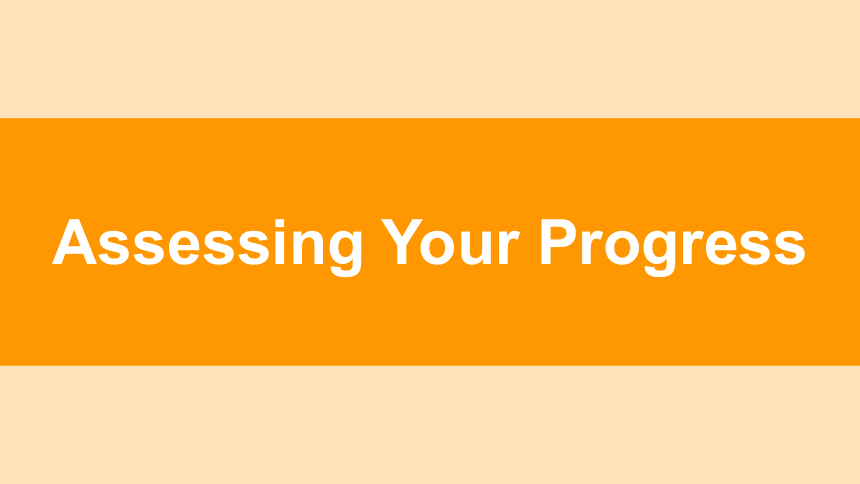
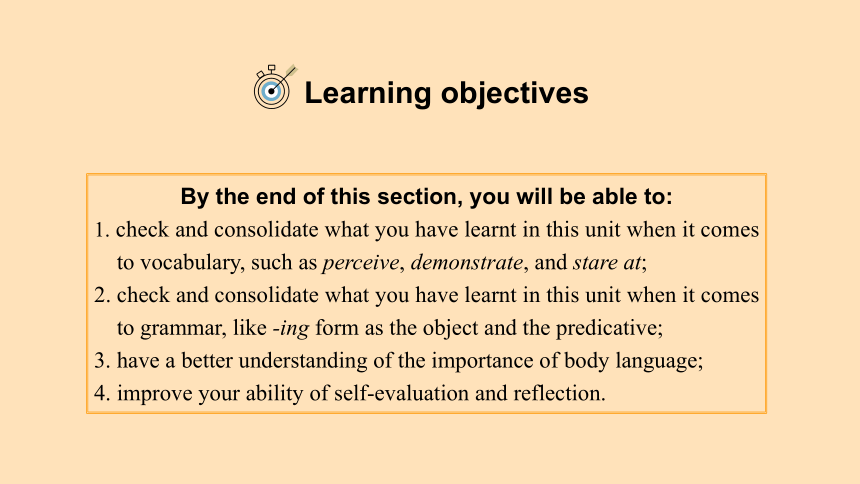
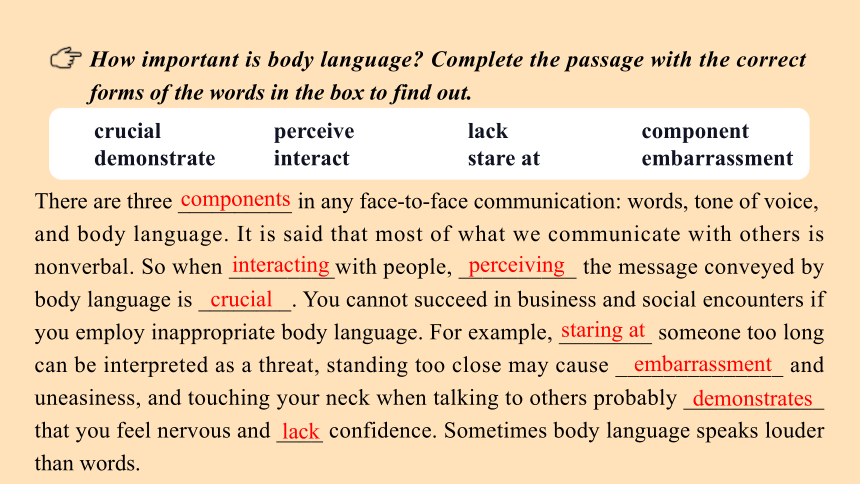
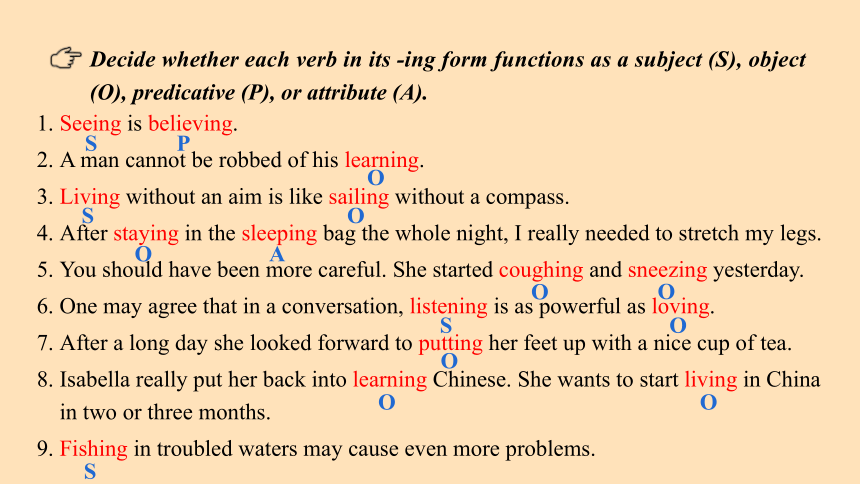
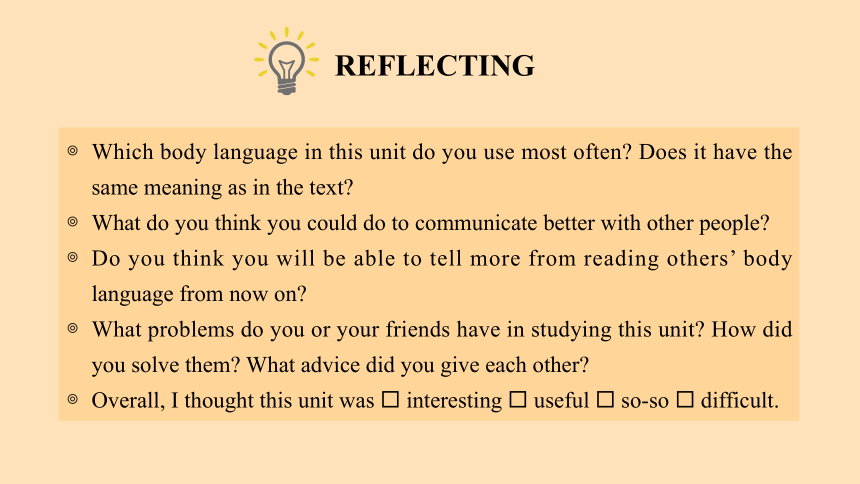

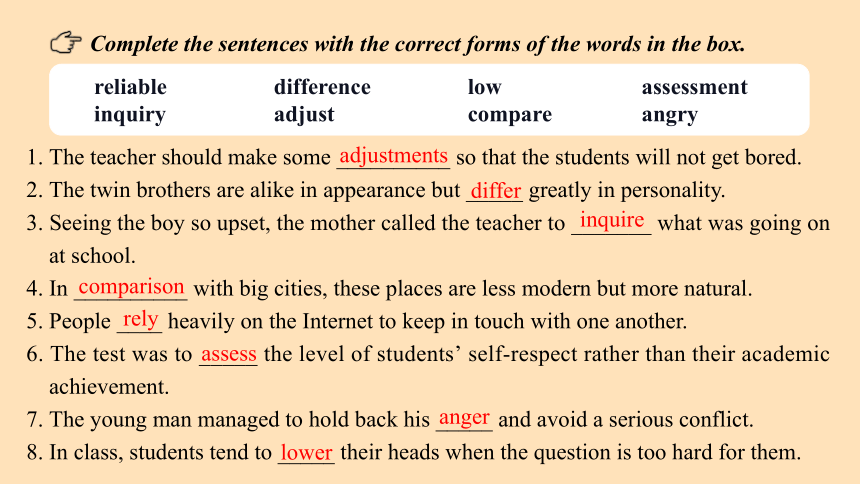
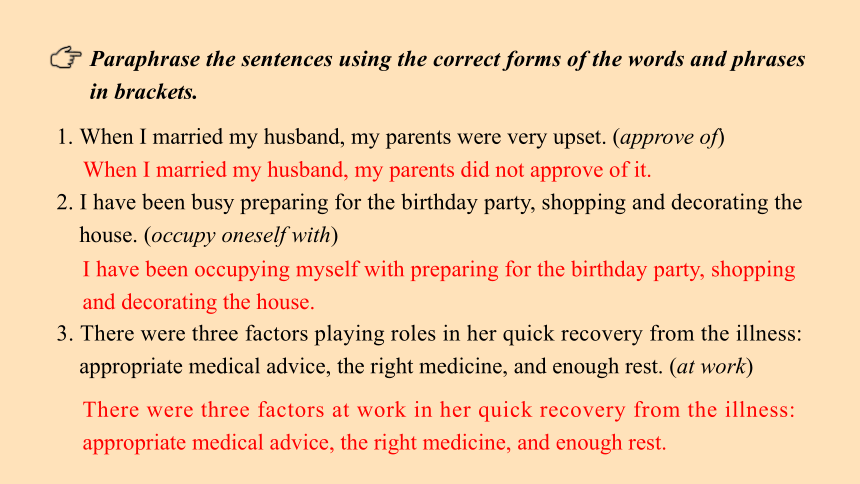
文档简介
(共23张PPT)
人教版(2019)选择性必修一
Unit 4 Body Language
Assessing Your Progress & Project
Assessing Your Progress
Learning objectives
By the end of this section, you will be able to:
1. check and consolidate what you have learnt in this unit when it comes
to vocabulary, such as perceive, demonstrate, and stare at;
2. check and consolidate what you have learnt in this unit when it comes
to grammar, like -ing form as the object and the predicative;
3. have a better understanding of the importance of body language;
4. improve your ability of self-evaluation and reflection.
How important is body language Complete the passage with the correct forms of the words in the box to find out.
crucial perceive lack component
demonstrate interact stare at embarrassment
There are three __________ in any face-to-face communication: words, tone of voice, and body language. It is said that most of what we communicate with others is nonverbal. So when _________with people, __________ the message conveyed by body language is ________. You cannot succeed in business and social encounters if you employ inappropriate body language. For example, ________ someone too long can be interpreted as a threat, standing too close may cause ______________ and uneasiness, and touching your neck when talking to others probably ____________ that you feel nervous and ____ confidence. Sometimes body language speaks louder than words.
components
interacting
perceiving
crucial
embarrassment
staring at
demonstrates
lack
Decide whether each verb in its -ing form functions as a subject (S), object (O), predicative (P), or attribute (A).
1. Seeing is believing.
2. A man cannot be robbed of his learning.
3. Living without an aim is like sailing without a compass.
4. After staying in the sleeping bag the whole night, I really needed to stretch my legs.
5. You should have been more careful. She started coughing and sneezing yesterday.
6. One may agree that in a conversation, listening is as powerful as loving.
7. After a long day she looked forward to putting her feet up with a nice cup of tea.
8. Isabella really put her back into learning Chinese. She wants to start living in China
in two or three months.
9. Fishing in troubled waters may cause even more problems.
S
P
O
S
O
O
A
O
O
S
O
O
O
O
S
REFLECTING
Which body language in this unit do you use most often Does it have the same meaning as in the text
What do you think you could do to communicate better with other people
Do you think you will be able to tell more from reading others’ body language from now on
What problems do you or your friends have in studying this unit How did you solve them What advice did you give each other
Overall, I thought this unit was interesting useful so-so difficult.
Workbook
1. The teacher should make some __________ so that the students will not get bored.
2. The twin brothers are alike in appearance but _____ greatly in personality.
3. Seeing the boy so upset, the mother called the teacher to _______ what was going on
at school.
4. In __________ with big cities, these places are less modern but more natural.
5. People ____ heavily on the Internet to keep in touch with one another.
6. The test was to _____ the level of students’ self-respect rather than their academic
achievement.
7. The young man managed to hold back his _____ and avoid a serious conflict.
8. In class, students tend to _____ their heads when the question is too hard for them.
Complete the sentences with the correct forms of the words in the box.
reliable difference low assessment
inquiry adjust compare angry
adjustments
differ
inquire
comparison
rely
assess
anger
lower
Paraphrase the sentences using the correct forms of the words and phrases in brackets.
1. When I married my husband, my parents were very upset. (approve of)
2. I have been busy preparing for the birthday party, shopping and decorating the
house. (occupy oneself with)
3. There were three factors playing roles in her quick recovery from the illness:
appropriate medical advice, the right medicine, and enough rest. (at work)
When I married my husband, my parents did not approve of it.
I have been occupying myself with preparing for the birthday party, shopping and decorating the house.
There were three factors at work in her quick recovery from the illness:
appropriate medical advice, the right medicine, and enough rest.
Paraphrase the sentences using the correct forms of the words and phrases in brackets.
4. When problems occur, people usually find excuses to avoid responsibility.
(tendency)
5. The colours of the forest change with the season. (vary from … to)
6. I believe whatever you say and will always take your side. (favour)
When problems occur, people have a tendency to find excuses to avoid
responsibility.
The colours of the forest vary from season to season.
I believe whatever you say and will always favour you.
Complete the passage with the correct forms of the words from this unit.
Educators can p what students are thinking by observing their body language. Students tend to l forward and make eye contact with teachers when they are interested in the lesson. By c , if they have their heads l or look e , they are probably bored, or a by something else. By looking at a student’s body language, an educator can also
i whether the student is troubled or having personal problems. Observing students’ body language helps teachers a students’ behaviour and thus take effective measures to help them learn better.
erceive
ean
omparison
owered
lsewhere
ttracted
dentify
ssess
Translate the sentences into English using the words and phrases in brackets.
1. 有些学生回避与老师的眼神交流,只是因为担心被老师叫起来回答问题。
(merely, call on)
2. 他忙着写毕业论文,几乎没有时间好好吃饭。(barely, bother, occupy)
3. 小孩子们会盯着一件他们喜欢的东西来表达他们的兴趣。(tend to, stare
at, display)
Some students avoid eye contact with the teacher merely because they are
afraid that the teacher will call on them to answer questions.
He is so occupied with writing his graduation thesis that he barely bothers
eating well.
Little children tend to display their interest by staring at something that they
like.
Translate the sentences into English using the words and phrases in brackets.
4. 最终他们赢了这场比赛,向所有的球迷证明了他们是一支实力强大的足
球队。(ultimately, demonstrate)
5. 我亲眼见证了这对年轻的夫妻如何熬过了他们人生中最困难的时期。
(witness, get through)
6. 恰当地利用肢体语言可以帮助你克服与人交流的障碍。(employ,
appropriately, break down, barrier)
They ultimately won the game and demonstrated to all football fans that they were a powerful team.
I witnessed how this young couple got through the most difficult time in their life.
Employing body language appropriately can help you break down communication barriers.
Project
Make a body language information sheet
Learning objectives
By the end of this section, you will be able to:
1. learn how to make a body language information sheet;
2. use knowledge you have learnt to make a body language information
sheet;
3. correctly use body language in a way that is appropriate to the culture
you are in;
4. improve your ability of evaluation and appreciation during displaying
your information sheet.
Preparation
In groups, brainstorm a list of different kinds of body language. Use the information from this unit, your own experience and knowledge, and/or the website excerpt below.
Based on your list, research online to discover what the same kinds of body
language mean in different cultures.
Each group should come up with its own body language information sheet like the example below. Drawings and/or photos can be added to show what the different forms of body language look like.
Body Language Information Sheet
Body language Meaning in China Meaning in other countries
Moving the hand in circles over the stomach after a meal. Almost everywhere: I’m full.
The “OK” sign. OK, agreement Japan: money
France: zero
Brazil and Germany: not polite
... ... ...
Make a sheet
Body Language Information Sheet
Body language Meaning in China Meaning in other countries
Bowing From the waist show thanks, to apologise Japan: a greeting, to show thanks, to apologise
With hands raised and pressed together India, Sri Lanka, Nepal, Bhutan, Thailand, Cambodia, Laos, Myanmar, and Indonesia: a greeting
With a nod of the head the US, the UK: a greeting, acknowledgement, or agreement
Germany: a greeting
Body Language Information Sheet
Body language Meaning in China Meaning in other countries
A pat on the head affection the US: affection
Indonesia: taboo
flirting, giving implication the US: a sign that someone is joking or telling a harmless lie
Latin America: flirting
West Africa: a sign by parents to tell their children to leave the room when adult guests are present
Winking
Body Language Information Sheet
Body language Meaning in China Meaning in other countries
V sign (two fingers raised up) With the back of the hands facing outwards victory the UK, Australia, New Zealand: an insult
With the back of the hands facing inwards
the US: peace
the UK: victory
Thumb and pinkie raised, other fingers closed six Hawaii: greeting, thanks, “Take it easy!”
the US: “Call me!”
Present your information sheet to the class, and then vote on the best one.
Evaluation
According to the teacher’s and classmates’ evaluation, polish up your body language information sheet.
Homework
人教版(2019)选择性必修一
Unit 4 Body Language
Assessing Your Progress & Project
Assessing Your Progress
Learning objectives
By the end of this section, you will be able to:
1. check and consolidate what you have learnt in this unit when it comes
to vocabulary, such as perceive, demonstrate, and stare at;
2. check and consolidate what you have learnt in this unit when it comes
to grammar, like -ing form as the object and the predicative;
3. have a better understanding of the importance of body language;
4. improve your ability of self-evaluation and reflection.
How important is body language Complete the passage with the correct forms of the words in the box to find out.
crucial perceive lack component
demonstrate interact stare at embarrassment
There are three __________ in any face-to-face communication: words, tone of voice, and body language. It is said that most of what we communicate with others is nonverbal. So when _________with people, __________ the message conveyed by body language is ________. You cannot succeed in business and social encounters if you employ inappropriate body language. For example, ________ someone too long can be interpreted as a threat, standing too close may cause ______________ and uneasiness, and touching your neck when talking to others probably ____________ that you feel nervous and ____ confidence. Sometimes body language speaks louder than words.
components
interacting
perceiving
crucial
embarrassment
staring at
demonstrates
lack
Decide whether each verb in its -ing form functions as a subject (S), object (O), predicative (P), or attribute (A).
1. Seeing is believing.
2. A man cannot be robbed of his learning.
3. Living without an aim is like sailing without a compass.
4. After staying in the sleeping bag the whole night, I really needed to stretch my legs.
5. You should have been more careful. She started coughing and sneezing yesterday.
6. One may agree that in a conversation, listening is as powerful as loving.
7. After a long day she looked forward to putting her feet up with a nice cup of tea.
8. Isabella really put her back into learning Chinese. She wants to start living in China
in two or three months.
9. Fishing in troubled waters may cause even more problems.
S
P
O
S
O
O
A
O
O
S
O
O
O
O
S
REFLECTING
Which body language in this unit do you use most often Does it have the same meaning as in the text
What do you think you could do to communicate better with other people
Do you think you will be able to tell more from reading others’ body language from now on
What problems do you or your friends have in studying this unit How did you solve them What advice did you give each other
Overall, I thought this unit was interesting useful so-so difficult.
Workbook
1. The teacher should make some __________ so that the students will not get bored.
2. The twin brothers are alike in appearance but _____ greatly in personality.
3. Seeing the boy so upset, the mother called the teacher to _______ what was going on
at school.
4. In __________ with big cities, these places are less modern but more natural.
5. People ____ heavily on the Internet to keep in touch with one another.
6. The test was to _____ the level of students’ self-respect rather than their academic
achievement.
7. The young man managed to hold back his _____ and avoid a serious conflict.
8. In class, students tend to _____ their heads when the question is too hard for them.
Complete the sentences with the correct forms of the words in the box.
reliable difference low assessment
inquiry adjust compare angry
adjustments
differ
inquire
comparison
rely
assess
anger
lower
Paraphrase the sentences using the correct forms of the words and phrases in brackets.
1. When I married my husband, my parents were very upset. (approve of)
2. I have been busy preparing for the birthday party, shopping and decorating the
house. (occupy oneself with)
3. There were three factors playing roles in her quick recovery from the illness:
appropriate medical advice, the right medicine, and enough rest. (at work)
When I married my husband, my parents did not approve of it.
I have been occupying myself with preparing for the birthday party, shopping and decorating the house.
There were three factors at work in her quick recovery from the illness:
appropriate medical advice, the right medicine, and enough rest.
Paraphrase the sentences using the correct forms of the words and phrases in brackets.
4. When problems occur, people usually find excuses to avoid responsibility.
(tendency)
5. The colours of the forest change with the season. (vary from … to)
6. I believe whatever you say and will always take your side. (favour)
When problems occur, people have a tendency to find excuses to avoid
responsibility.
The colours of the forest vary from season to season.
I believe whatever you say and will always favour you.
Complete the passage with the correct forms of the words from this unit.
Educators can p what students are thinking by observing their body language. Students tend to l forward and make eye contact with teachers when they are interested in the lesson. By c , if they have their heads l or look e , they are probably bored, or a by something else. By looking at a student’s body language, an educator can also
i whether the student is troubled or having personal problems. Observing students’ body language helps teachers a students’ behaviour and thus take effective measures to help them learn better.
erceive
ean
omparison
owered
lsewhere
ttracted
dentify
ssess
Translate the sentences into English using the words and phrases in brackets.
1. 有些学生回避与老师的眼神交流,只是因为担心被老师叫起来回答问题。
(merely, call on)
2. 他忙着写毕业论文,几乎没有时间好好吃饭。(barely, bother, occupy)
3. 小孩子们会盯着一件他们喜欢的东西来表达他们的兴趣。(tend to, stare
at, display)
Some students avoid eye contact with the teacher merely because they are
afraid that the teacher will call on them to answer questions.
He is so occupied with writing his graduation thesis that he barely bothers
eating well.
Little children tend to display their interest by staring at something that they
like.
Translate the sentences into English using the words and phrases in brackets.
4. 最终他们赢了这场比赛,向所有的球迷证明了他们是一支实力强大的足
球队。(ultimately, demonstrate)
5. 我亲眼见证了这对年轻的夫妻如何熬过了他们人生中最困难的时期。
(witness, get through)
6. 恰当地利用肢体语言可以帮助你克服与人交流的障碍。(employ,
appropriately, break down, barrier)
They ultimately won the game and demonstrated to all football fans that they were a powerful team.
I witnessed how this young couple got through the most difficult time in their life.
Employing body language appropriately can help you break down communication barriers.
Project
Make a body language information sheet
Learning objectives
By the end of this section, you will be able to:
1. learn how to make a body language information sheet;
2. use knowledge you have learnt to make a body language information
sheet;
3. correctly use body language in a way that is appropriate to the culture
you are in;
4. improve your ability of evaluation and appreciation during displaying
your information sheet.
Preparation
In groups, brainstorm a list of different kinds of body language. Use the information from this unit, your own experience and knowledge, and/or the website excerpt below.
Based on your list, research online to discover what the same kinds of body
language mean in different cultures.
Each group should come up with its own body language information sheet like the example below. Drawings and/or photos can be added to show what the different forms of body language look like.
Body Language Information Sheet
Body language Meaning in China Meaning in other countries
Moving the hand in circles over the stomach after a meal. Almost everywhere: I’m full.
The “OK” sign. OK, agreement Japan: money
France: zero
Brazil and Germany: not polite
... ... ...
Make a sheet
Body Language Information Sheet
Body language Meaning in China Meaning in other countries
Bowing From the waist show thanks, to apologise Japan: a greeting, to show thanks, to apologise
With hands raised and pressed together India, Sri Lanka, Nepal, Bhutan, Thailand, Cambodia, Laos, Myanmar, and Indonesia: a greeting
With a nod of the head the US, the UK: a greeting, acknowledgement, or agreement
Germany: a greeting
Body Language Information Sheet
Body language Meaning in China Meaning in other countries
A pat on the head affection the US: affection
Indonesia: taboo
flirting, giving implication the US: a sign that someone is joking or telling a harmless lie
Latin America: flirting
West Africa: a sign by parents to tell their children to leave the room when adult guests are present
Winking
Body Language Information Sheet
Body language Meaning in China Meaning in other countries
V sign (two fingers raised up) With the back of the hands facing outwards victory the UK, Australia, New Zealand: an insult
With the back of the hands facing inwards
the US: peace
the UK: victory
Thumb and pinkie raised, other fingers closed six Hawaii: greeting, thanks, “Take it easy!”
the US: “Call me!”
Present your information sheet to the class, and then vote on the best one.
Evaluation
According to the teacher’s and classmates’ evaluation, polish up your body language information sheet.
Homework
